Ukraine war: Moscow to formally annex Russia-occupied regions of Ukraine
Vladimir Putin is set to make a bold decision over Russian-occupied regions of Ukraine, despite warnings from the West.
World
Don't miss out on the headlines from World. Followed categories will be added to My News.
Moscow will formally annex four Russia-occupied regions of Ukraine at a Kremlin ceremony on Friday, President Vladimir Putin’s spokesman said Thursday.
“Tomorrow in the Georgian Hall of the Grand Kremlin Palace at 15:00 (10pm AEST) a signing ceremony will take place on the incorporation of the new territories into Russia,” spokesman Dmitry Peskov said.
He added that the Russian leader will make a major speech at the event.
Ukraine’s Lugansk, Donetsk, Kherson and Zaporizhzhia regions are occupied by the Russian army, which Putin sent over the border in February.
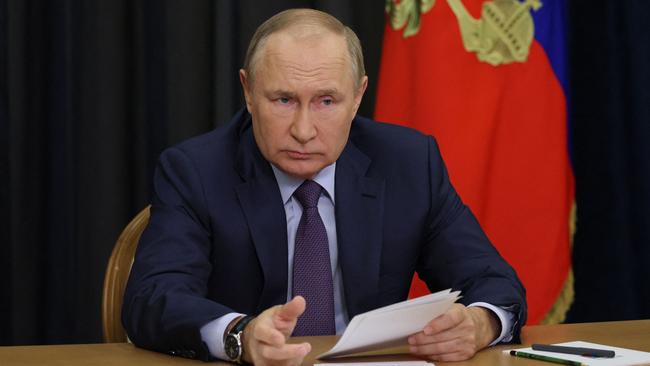
Moscow organised what it called referendums in the four regions that it controls, with Kremlin-installed officials saying this week residents backed joining Russia.
All four Moscow-backed leaders of the regions said they were in Moscow and expecting a meeting with Mr Putin.
The move comes eight years after Moscow annexed the Crimea peninsula from Ukraine and would mark a significant escalation in the conflict.
The West has warned Russia not to press ahead with the annexations, with the G7 saying it would “never recognise” the move.
Kyiv has asked for more military aid as a response.
SUSPICION GROWS OVER GAS LEAK ‘SABOTAGE’
Moscow has questioned whether Washington caused mystery undersea gas pipeline leaks in Europe that have been blamed on sabotage, in a turn of the tables that US officials bluntly called “ridiculous”.
The three outflows from the Russia-Germany Nord Stream 1 and 2 pipelines have sent natural gas prices soaring, exacerbating an energy crunch in Europe as it stands on the threshold of winter and fanning geopolitical tensions.
Swedish intelligence announced it was opening an investigation into the massive leaks in the Baltic Sea, branding them “aggravated sabotage”, just hours after the EU called the damage “deliberate”.
But the question of who is responsible has prompted high-level finger-pointing, with Moscow charging the US had already said Nord Stream 2 was “finished” if Russia invaded Ukraine.
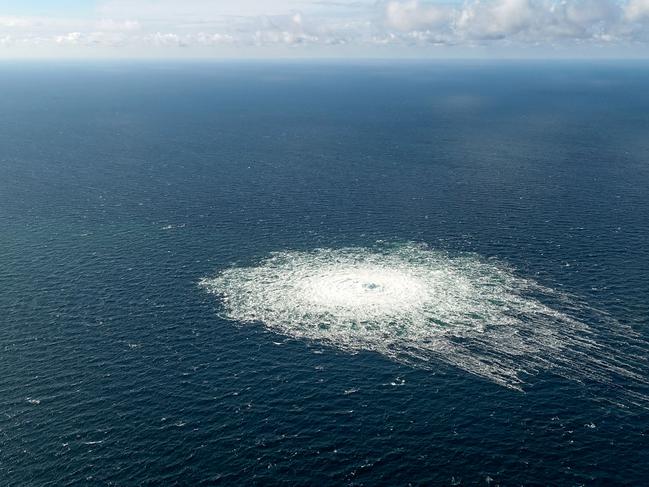
US President Joe “Biden is obliged to answer the question of whether the US carried out its threat,” foreign ministry spokeswoman Maria Zakharova said on social media on Wednesday.
Washington dismissed the suggestion, with a spokeswoman for the National Security Council saying: “We all know Russia has a long history of spreading disinformation and is doing it again here.”
Among Western allies, suspicion for the leaks has focused on Russia, which has cut gas supplies to Europe in retaliation for severe Western sanctions over the war in Ukraine.
Russia replied on Wednesday by saying it will ask for the United Nations Security Council to convene “in connection with provocations” regarding the ruptured pipes.
Kremlin spokesman Dmitry Peskov dismissed any accusations of sabotage as “predictable, stupid and absurd”.
European Commission head Ursula von der Leyen said deliberate disruption would meet the “strongest possible response”. The EU has previously accused Russia of using gas supplies as a weapon against the West over its support for Ukraine but fell short of directly pointing the finger at Moscow over the gas leaks.
The US Secretary of State Antony Blinken said he thought the leaks would “not have a significant impact on Europe’s energy resilience”. Neither pipeline is transporting gas at the moment, although they both contain gas.Mr Blinken did not directly accuse Russia - but said it would be in “no-one’s interest” if they were caused deliberately.
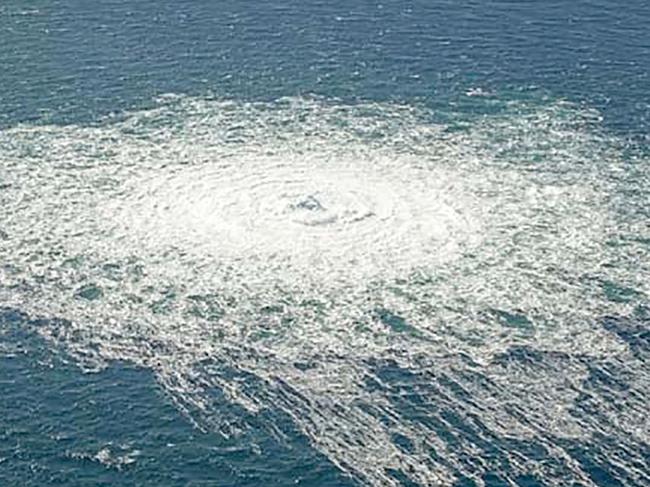
Following Europe’s sabotage allegations, fossil fuel-rich Norway boosted security at its installations in response.
They “are not a coincidence”, EU foreign policy chief Josep Borrell said in a statement. “All available information indicates those leaks are the result of a deliberate act.” He warned: “Any deliberate disruption of European energy infrastructure is utterly unacceptable and will be met with a robust and united response.” EU chiefs Ursula von der Leyen and Charles Michel have also blamed the Nord Stream leaks on sabotage, as have leaders of several European countries.
RUSSIAN GAS PIPELINE TO EUROPE ‘SABOTAGED’
Russia and Ukraine have accused each other of “sabotage” and a “terrorist attack” after large-scale leaks from pipelines into Europe spilt gas into the Baltic Sea.
Nord Stream said “unprecedented” damage was sustained to three offshore gas lines on the bed of the Baltic Sea, with two underwater blasts recorded prior to the discovery of the leaks on the pipeline linking Russia and Europe.
Ukraine presidential advisor Mikhaylo Podolyak said on Twitter they were likely a “terrorist attack” by Moscow, while Kremlin spokesman Dmitry Peskov told reporters they could not rule out sabotage.
The leak prompted Denmark to restrict shipping in a five nautical mile radius.
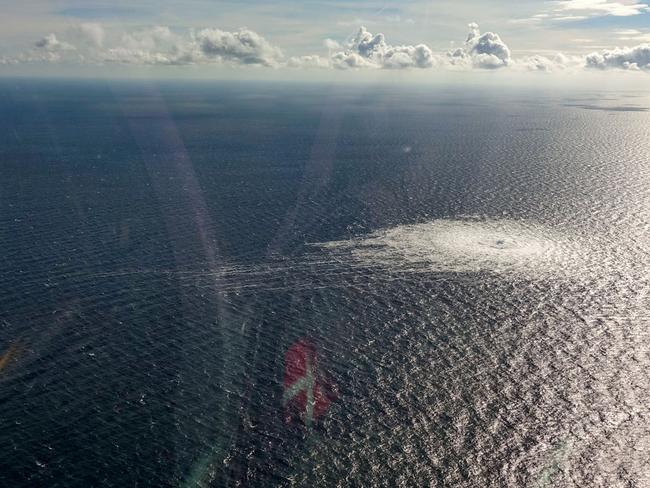
The Swedish National Seismic Network recorded two “massive releases of energy” near the location of the gas leaks off the coast of the Danish island of Bornholm, Peter Schmidt, an Uppsala University seismologist, said.
The first happened at just southeast of Bornholm with a magnitude of 1.9, followed by a larger 2.3 magnitude event a little further north.
“With energy releases this big there isn’t much else than a blast that could cause it,” Schmidt said, adding they were “very sudden” and not a “slow collapse”.
“In all likelihood some type of blasts,” he said.
Se video og fotos af gaslækagerne på Nord Stream 1 og 2-gasledningerne i Østersøen på https://t.co/pj96CN7CDB: https://t.co/7bgt8TljaH#dkforsvarpic.twitter.com/I1zEPaBLYO
— Forsvaret (@forsvaretdk) September 27, 2022
The Norwegian Seismic Array (NORSAR) also confirmed it had registered “a smaller explosion” in the early hours of Monday, “followed by a more powerful on Monday evening.”
The Nord Stream 1 and 2 pipelines have been at the centre of geopolitical tensions in recent months as Russia cut gas supplies to Europe in suspected retaliation against Western sanctions following its invasion of Ukraine.
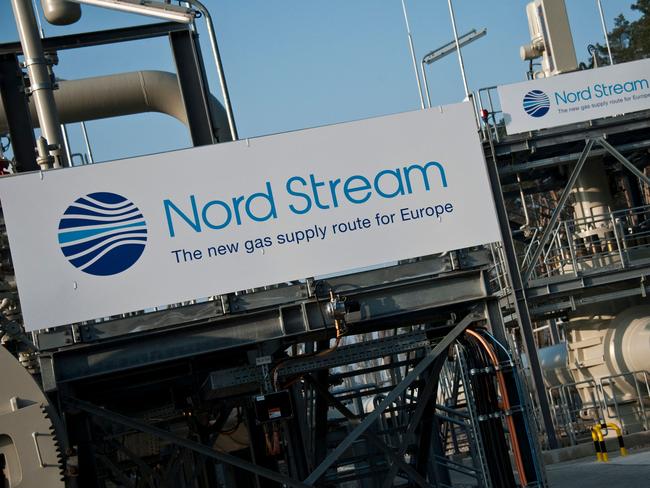
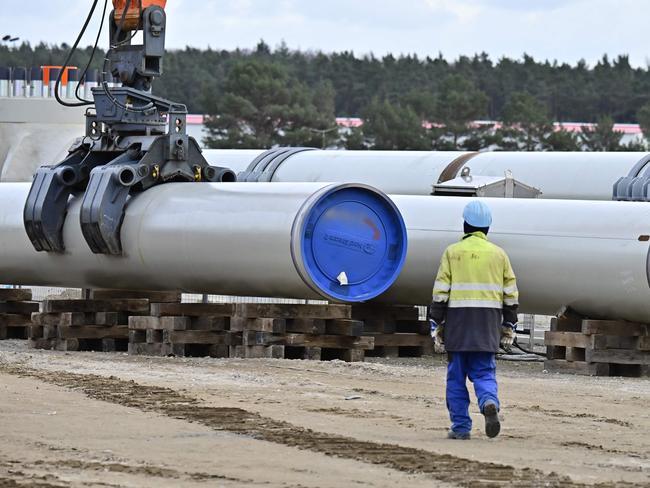
While the pipelines, which are operated by a consortium majority-owned by Russian gas giant Gazprom, are not currently in operation, they both still contain gas which has been leaking out since Monday.
Photos taken by the Danish military on Tuesday showed large masses of bubbles on the surface of the water emanating from the three leaks located in Sweden’s and Denmark’s economic zones, spreading from 200 to 1,000 metres in diameter.
Tom Marzec-Manser, head of Gas Analytics at ICIS, said gas leaks at both Nord Stream 1 and Nord Stream 2 in three separate locations were likely not a coincidence.
“The timing of this development in relation to the start of the gas winter, on 1 October, as well as the commissioning of the brand-new Baltic Pipe – that will supply Norwegian gas to Poland and crosses over the Russian lines – all create further tension in the market,” he told Reuters.
‘DIABOLICAL’: US REJECTS ‘SHAM’ ELECTION TO JOIN RUSSIA
US Secretary of State Antony Blinken vowed Tuesday that the West will never recognise Russia’s annexation of Ukrainian territory, which he called part of a “diabolical scheme” by Moscow.
“We and many other countries have already been crystal clear. We will not – indeed, we will never – recognise the annexation of Ukrainian territory by Russia,” Blinken told reporters as Kremlin proxies started to claim victory.
“It’s important to remember what’s going on here. Russia invaded Ukraine, seized territory and is engaged in a diabolical scheme on some of the territory it seized where it has moved the local populace out,” he said.
Some people are deported and others “simply disappear,” Blinken said.
“Then they bus Russians in, they install puppet governments and they engage in the referendum and manipulate, in any event, the outcome to then claim that the territory belongs to Russia.”
NATO’s chief Jens Stoltenberg added the votes in four occupied regions in Ukraine on annexation by Russia are a “a blatant violation of international law.”
“The sham referendums held by Russia have no legitimacy,” he said.
It comes as Kremlin-installed authorities were claiming the uncounted ballots had gone Russia’s way.
CONSCRIPT GUNS DOWN OFFICER
This is the moment an anti-war protester allegedly walked into a Russian recruitment office and opened fire, declaring: “No one will go fighting. We will all go home now”.
Footage of the shocking incident showed four gunshots before a man identified as 25-year-old Ruslan Zinin is arrested for fatally shooting military recruiter Aleksandr Yeliseyev.
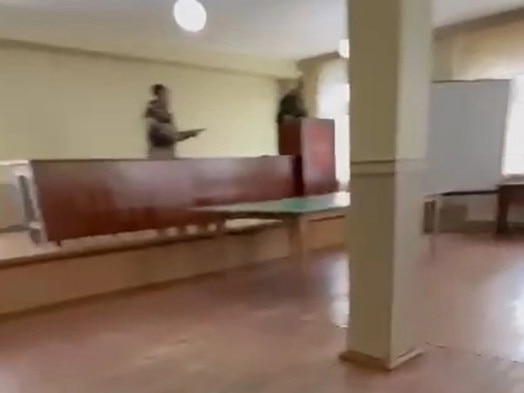
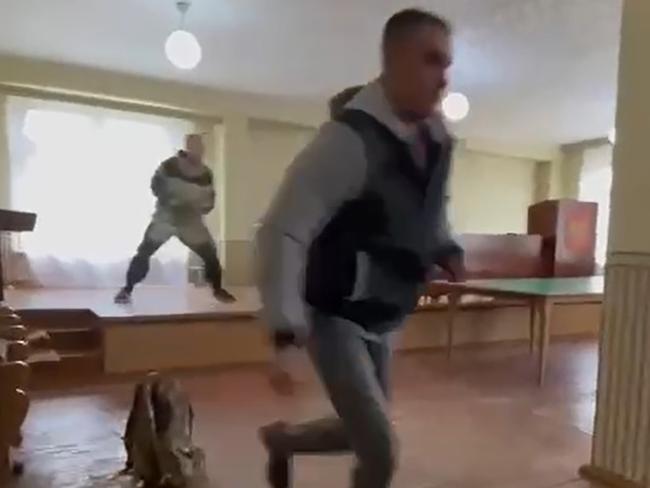
A dozen men screaming as they flee the conscription office in the city of Ust-Ilimsk, in the Irkutsk region of Siberia.
Conflicting Ukraine and Russian media reports said the officer, Mr Yeliseyev, either died after the shooting or was fighting for his life in intensive care.
Irkutsk regional governor, Igor Kobzev, said on Telegram that Mr Zinin would “absolutely be punished”.
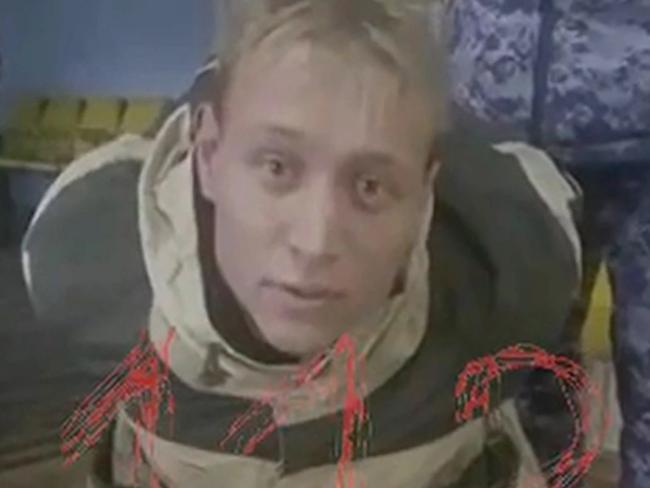
Mr Zinin was said to be upset his best friend, who had no combat experience, was called up for the war.
He allegedly opened fire after the recruitment officer gave a “clumsy” pep talk about the fight in Ukraine.
Mobilized man killed a drafting office commander in Ust-Ilimsk, Irkutsk region, Russia.
— Anton Gerashchenko (@Gerashchenko_en) September 26, 2022
Alexandr Yeliseev, the commander, was shot four times almost point blank.
The murderer is Ruslan Zinin, born in 1997, "partially mobilized". He decided jail is better than death in Ukraine. pic.twitter.com/s0IvHJZJBO
KREMLIN’S BIG ADMISSION
The head of the United Nations atomic energy watchdog said on Monday he was ready to continue talks in Ukraine and Russia this week to set up a security zone around a key nuclear power plant.
Fighting around Ukraine’s Zaporizhzhia nuclear power plant – Europe’s largest – has raised fears of a nuclear disaster.
Rafael Grossi, head of the International Atomic Energy Agency (IAEA), met the Ukrainian and Russian foreign ministers on the sidelines of the UN General Assembly last week to discuss setting up the security zone around the plant to protect it.
“This is possible. This must be done. And I’m ready to continue these consultations in both countries this week so that we can protect this plant,” he said in his opening statement at the agency’s annual general conference.
“The work there will allow us to stabilise a situation that is simply unacceptable. And I’m convinced that it’s something that we can do.”
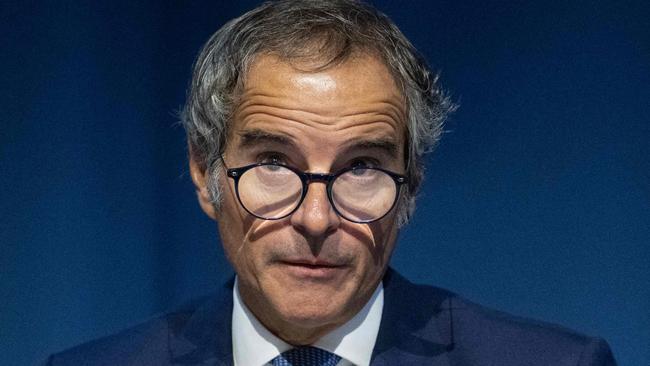
“This war must stop. But before that happens … we must do everything in our power to prevent a nuclear accident that would add tragedy to the suffering,” Mr Grossi added.
The IAEA and Western powers voiced alarm Wednesday over the safety of the Zaporizhzhia atomic power plant as Kyiv accused Russia of new shelling.
Europe’s largest atomic facility was seized by Russian troops in March, and shelling around it has spurred calls from Kyiv and its Western allies to demilitarise areas around nuclear plants in Ukraine.
A team of IAEA experts inspected the Zaporizhzhia atomic power plant in early September, and the IAEA has had a two-member team on site since then.
KREMLIN ADMITS CALL-UP ‘ERRORS’
The Kremlin admitted Monday that errors had been made during the mobilisation of reservists for the military action in Ukraine and said no decision had been taken to close Russia’s borders.
“Indeed, there are cases when the (mobilisation) decree was violated. In some regions, governors are actively working to rectify the situation,” Kremlin spokesman Dmitry Peskov told reporters.
“Instances of noncompliance (with the decree) are decreasing. We hope this will speed up and that all errors will be corrected.”
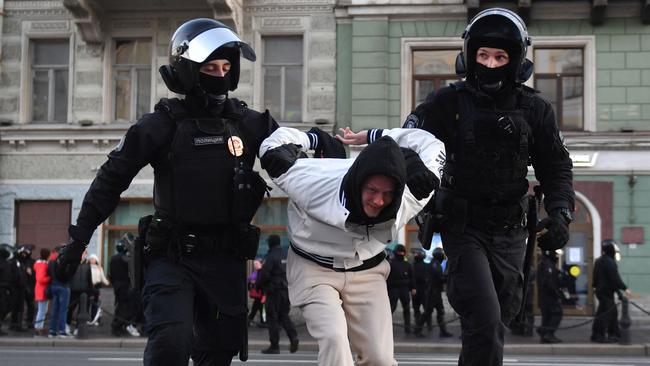
President Vladimir Putin last week announced the call-up of thousands of reservists for the conflict in Ukraine, sparking protests across the country and a rush among Russian men for the borders.
Answering questions from reporters, Peskov said, despite rumours to the contrary, no decision had been taken to seal Russia’s external borders and introduce martial law in some border regions.
“I don’t know anything about this. No decisions have been made for now,” he said.
SICK, ELDERLY DRAFTED FOR RUSSIA’S WAR
Russian authorities have promised to fix the mistakes in their troop call-up for Ukraine, after public outrage over students, older or sick people being ‘mistakenly’ ordered to report for duty.
When Russian President Vladimir Putin announced a partial mobilisation on Wednesday, he said only people with “relevant” skills or military experience would be concerned.
But many expressed outrage after seeing cases of authorities summoning people who were clearly unfit for service.
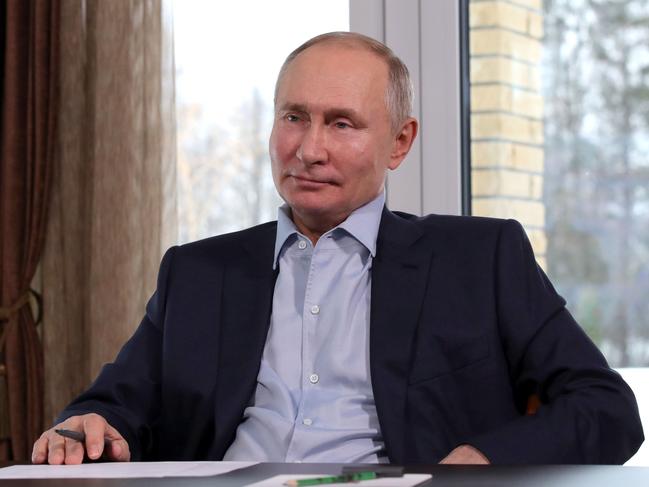
Authorities in the southwestern Russian region of Volgograd sent a 63-year-old diabetic ex-military staffer to training camp, despite poor health and cerebral issues.
The man came back home on Friday night, according to Russian state agency RIA Novosti.
In the same region, 58-year-old school director Alexander Faltin received a call-up order despite having no military experience. His daughter posted a video on social media that became viral.
He was allowed home after his documents were reviewed, according to RIA.
<<The 58 yo principal of a school in the Kalmykovsky Farm in the Volgograd region, Alexander Faltin, was visited at night, taken to the military office, from where he was sent to military training. Faltin never served in the army, has diabetes, hypertension and other diseases.>> https://t.co/sj4BOO5p0I
— just_chilling (@Ari_K1000) September 24, 2022
Upper house speaker Valentina Matviyenko called on all governors who oversee the mobilisation campaigns to avoid mistakes, in a rare admission on Sunday.
“Incorrect cases of mobilisation … are provoking fierce reactions in society, and rightly so,” Matviyenko said in a statement on Telegram.
“Some are assuming that handing in their report (to their superiors) quickly is more important than correctly fulfilling this important mission,” she added.
“This is unacceptable … Make sure that partial mobilisation is carried out in full and complete compliance with the criteria. And without a single mistake!” she ordered.
The errors are being painted by Russian authorities as isolated cases but reveal the latest in a string of logistic issues since the beginning of the Ukraine offensive in February.
Russia announced on Saturday the replacement of its highest ranking general in charge of logistics amid this mobilisation drive.
Newly mobilized Russian men are showing the rusted AK's they were given. pic.twitter.com/bRvVmdJC5b
— Christo Grozev (@christogrozev) September 24, 2022
On Saturday Valeriy Fadeev, chairman of the human rights council to the Kremlin, had urged defence minister Sergei Shoigu to “urgently resolve issues” to avoid “undermining the confidence of the people.”
He mentioned several aberrations including the recruitments of 70 fathers of large families in the Far Eastern Region of Buryatia, and of nurses and midwives without any military skills.
Several students told AFP they were given call-up papers, despite Russian authorities promising they would be left out of the recruitment drive.
On Saturday, Mr Putin signed a decree confirming students in secondary vocational and higher education institutions would be exempted from mobilisation.
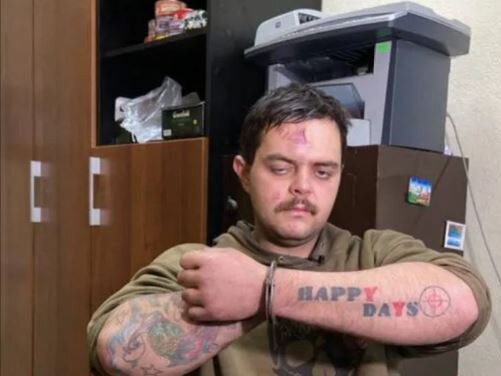
UK MAN ‘STABBED’, FORCED TO SING RUSSIAN ANTHEM
A British man freed from captivity in east Ukraine in a prisoner swap told Sunday how his captors stabbed him in the back and forced him to sing the Russian national anthem.
Aiden Aslin, who was freed and flown to Riyadh Wednesday with four other Britons held by Russian proxies, told The Sun in his first interview back in the UK that interrogators tortured him, promising him a “beautiful death”.
Aslin, 28, from Nottinghamshire in central England, was living in Ukraine and serving in its Marines when Russia invaded in February.
He was taken prisoner while fighting for Kyiv and sentenced to death in June by Russia-backed separatists in Donetsk in eastern Ukraine, charged with being a mercenary.
Aslin told The Sun he was repeatedly beaten with a truncheon during interrogation and at one point fell to the floor after being hit on the forehead.
An officer knelt by him and told him in Russian: “I am your death,” he said. “He pointed to my back. He showed me his knife and I realised he’d stabbed me,” said Aslin, who posed showing multiple scars on his back.
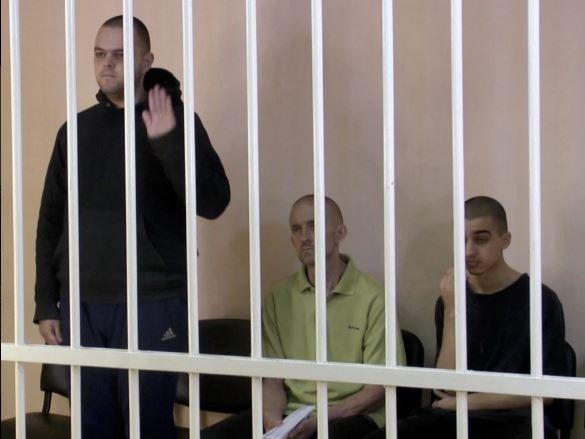
His captor then asked him if he wanted a quick death or a beautiful one, Aslin said. He responded a “quick death” and the man replied: “No, you’re going to have a beautiful death.”
Aslin was freed in a record-high swap involving the Saudi Crown Prince Mohammed bin Salman that saw Moscow receive a key Putin ally but hand over Ukrainian Azov fighters.
Aslin said he was held in solitary confinement in a tiny cell with lice, cockroaches and no daylight and “treated worse than a dog”.
The Sun reported his captors “played the Russian national anthem on a loop and ordered him to stand and sing it or be beaten again.
When they flipped open the grill of his cell, he was ordered to yell: “Glory to Russia.”
Aslin tweeted on Sunday: “After being forced to sing the Russian anthem every morning for the past 6 months I think it’s time to learn something a bit better and learn the Ukrainian anthem.”
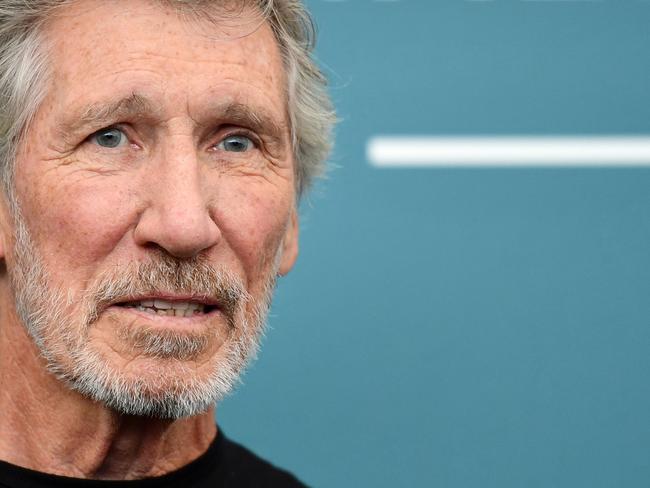
PINK FLOYD CONCERTS SCRAPPED OVER UKRAINE ROW
Pink Floyd’s Roger Waters lashed out on Sunday after two upcoming concerts in Krakow in Poland were scrapped following criticism from city councillors over his stance on the war in Ukraine.
The city council is scheduled to debate a motion this week that would declare Waters a “persona non grata” and one councillor, Lukasz Wantuch, had urged city residents to boycott the Waters concerts.
Waters wrote an open letter earlier this month saying the West should stop providing arms to Ukraine, accusing President Volodymyr Zelensky of allowing “extreme nationalism” in Ukraine and urging him to “put an end to this deadly war”.
Live Nation Polska said on Twitter on Saturday that the concerts, which had been scheduled for April next year at the city’s Tauron Arena, had been “cancelled” but did not give any more details.
Waters on Facebook denied Polish media reports that his team had pulled out but criticised Wantuch, accusing him of “draconian censoring of my work”.
“Lukasz Wantuch seems to know nothing of my history of working, all my life, at some personal cost, in the service of human rights,” Waters said.
Paraphrasing the words of his hit single “Another Brick in the Wall”, Waters also wrote: “Hey! Lukasz Wantuch! ‘Leave them Kids Alone!’”.
He said he had only wanted to urge the countries involved “to work towards a negotiated peace rather than escalate matters towards a bitter end”.
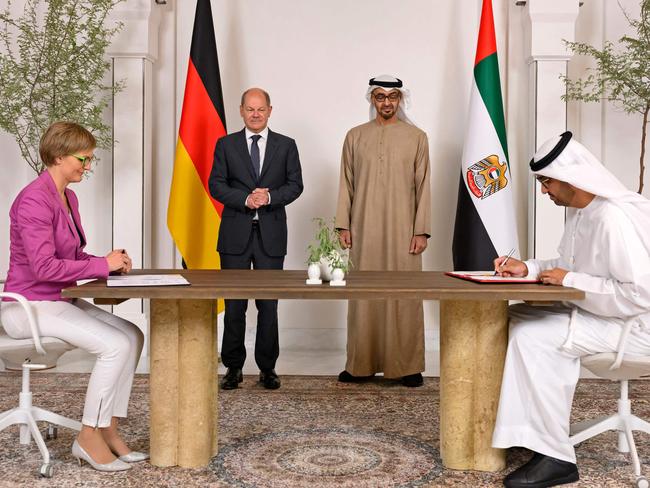
UAE OFFERS TO SUPPLY GERMANY WITH GAS, DIESEL
The United Arab Emirates agreed Sunday an “energy security” deal with Germany to supply liquefied natural gas and diesel as Berlin searches for new power sources to replace Russian supplies.
Emirati industry minister Sultan Ahmed Al Jaber called it a “landmark new agreement” that “reinforces the rapidly growing energy partnership between the UAE and Germany”, at a signing attended by German Chancellor Olaf Scholz, the UAE’s state news agency WAM reported.
Scholz was on a visit to the UAE as part of a Gulf tour that also includes stops in Saudi Arabia and Qatar.
He met with Emirati President Sheikh Mohamed bin Zayed Al-Nahyan, who said on Twitter afterwards they had discussed “further opportunities for co-operation in areas including energy security, emissions reduction and climate action”.
The German leader said he “welcomed” the “energy security” agreement, WAM said.
“The fact that we are dependent on one supplier and also dependent on its decisions will certainly not happen to us again,” he said.
“With the investments that we are now making in Germany, and that will become reality bit by bit next year, we will indeed have an infrastructure for gas imports for Germany, such that we are no longer directly dependent on the specific supplier at the other end of the pipeline, as we are with a pipeline connection.”
- With AFP
More Coverage
Originally published as Ukraine war: Moscow to formally annex Russia-occupied regions of Ukraine




